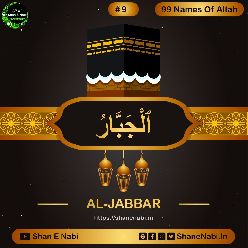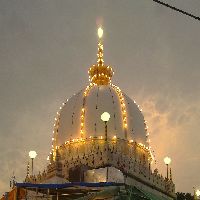ٱلْفَتَّاحُ
( فتح) ( फ़त्ताह)
calendar_month 27 Apr, 2023 visibility 47
Meanings of ( Al-Fattah):
Kholne wala
The Opener, The Judge
کھولنے والا
जज, खोलने वाला
Allah is Al-Fattah (in arabic: ٱلْفَتَّاحُ), meaning the opener, the revealer, and the granter of success. He opens or locks His doors of mercy to whom He pleases. Through His guidance, whatever is unclear becomes clear. Allah سُبْحَٰنَهُۥ وَتَعَٰلَىٰ has the best judgment and holds the keys to victory and success.

Mentions of Al-Fattah:
From Quran And Hadies (Hadith)
Arabic Root:
From the root fa-ta-ha (ف ت ح), which means to open. It has the following classical Arabic connotations: to open, unlock, unfold, to make victorious, to reveal, inform, explain, make clear, to judge, to decide, to grant, and to permit.
The Opener:
There are multiple meanings associated with this name. In Arabic, fath (فتح) means to open, and Al-Fattah (ٱلْفَتَّاحُ) is The Opener. This name takes on a perpetual form that is ever-lasting. He is the one that is always doing this again and again. Now, what is implied by the opening? What is that He opens? As we covered in the last name, Allah سُبْحَٰنَهُۥ وَتَعَٰلَىٰ holds the key to our sustenance (Ar-Razzaq), so naturally, He is considered the opener to provisions.
He is also the one who opens the door of mercy. Narrated by Abu Huraira, who reported Allah's Messenger ﷺ as saying: When it is the month of Ramadan, the gates of mercy are opened, and the gates of Hell are locked and the devils are chained. [1]
It can also mean providing guidance to one who is lost, revealing the unseen, a path untrodden. Sometimes we see things as impossible. Our minds were unable to see it in a different light. But that is until Allah سُبْحَٰنَهُۥ وَتَعَٰلَىٰ, in all His glory, clears our minds and opens the possibility for us. We are blinded and unable to see, i.e., until He reveals. So, we learn that Al-Fattah is the one who makes what seemed once impossible possible.
Allah سُبْحَٰنَهُۥ وَتَعَٰلَىٰ also opens the doors to His tests for both the believers and those who don't believe. He may open access to fame, wealth, or power just to see how we respond. For others, He may take it away. In the Qur'an, it mentions, "So when they forgot that by which they had been reminded, We opened to them the doors of every [good] thing until, when they rejoiced in that which they were given, We seized them suddenly, and they were [then] in despair." (Qur'an 6:44)
Al-Fattah in the Qur'an:
Moving onto the instances of the name Al-Fattah as mentioned in the Qur'an. It appears only once; however, many verses exemplify this attribute of Allah سُبْحَٰنَهُۥ وَتَعَٰلَىٰ. Below is the ayah in which this name was revealed.
قُلْ يَجْمَعُ بَيْنَنَا رَبُّنَا ثُمَّ يَفْتَحُ بَيْنَنَا بِٱلْحَقِّ وَهُوَ ٱلْفَتَّاحُ ٱلْعَلِيمُ
Qul yajma'u bainanaa Rabbunaa summa yaftahu bainanaa bilhaqq; wa Huwal Fattaahul Aleem
English Translation:
Say, "Our Lord will bring us together; then He will judge between us in truth. And He is the Knowing Judge."— (Qur'an 34:26)
Reflection:
By being vulnerable to oneself, by opening up towards Allah سُبْحَٰنَهُۥ وَتَعَٰلَىٰ you give yourself the opportunity for Allah سُبْحَٰنَهُۥ وَتَعَٰلَىٰ to open His doors of mercy for you. Abu Hurairah narrated that the Messenger of Allah ﷺ said: "Indeed Allah Most High says: 'I am as My slave thinks of Me, and I am with him when He calls upon Me.'" [2]
From this name, we further recognize that Allah سُبْحَٰنَهُۥ وَتَعَٰلَىٰ is the only one we need to rely upon. Whatever it is we need access to, Al-Fattah is the one who can open it for us. If you're feeling stuck or struggling to make a decision, pray salat al-istikhara. Ask Allah سُبْحَٰنَهُۥ وَتَعَٰلَىٰ to open your heart to make the right choice. He is the best judge who knows whether a thing will benefit you in your deen, relationship, or livelihood.
The Prophet ﷺ recommended that when we enter the masjid, we should make this du'a, اللَّهُمَّ افْتَحْ لِي أَبْوَابَ رَحْمَتِكَ Allahumma-iftah li abwaba rahmatik which means, "O Allah! Open for me the gates of Your mercy!" [3] This beautiful du'a keeps in mind that when we enter a masjid, we seek to experience Allah's mercy. This dhikr is an active remembrance of this fact. It asks Allah سُبْحَٰنَهُۥ وَتَعَٰلَىٰ directly to open His gates of mercy for us.
The hadith then continues, "And when he leaves (the masjid), let him say: اللَّهُمَّ إِنِّي أَسْأَلُكَ مِنْ فَضْلِكَ Allahumma inni as'aluka min fadlika, meaning 'O Allah, I ask of you from Your bounty.'" The lesson is, when you enter a masjid, seek His mercy and look towards your afterlife, but when you leave, seek His grace and bounty so you can succeed in this Dunya.
مَّا يَفْتَحِ ٱللَّهُ لِلنَّاسِ مِن رَّحْمَةٍۢ فَلَا مُمْسِكَ لَهَا ۖ وَمَا يُمْسِكْ فَلَا مُرْسِلَ لَهُۥ مِنۢ بَعْدِهِۦ ۚ وَهُوَ ٱلْعَزِيزُ ٱلْحَكِيمُ
Maa yaftahil laahu linnaaasi mir rahmatin falaa mumsika lahaa wa maa yumsik falaa mursila lahoo mimba'dihi; wa Huwal Azeezul Hakeem
English Translation:
"Whatever Allah grants to people of mercy – none can withhold it; and whatever He withholds – none can release it thereafter. And He is the Exalted in Might, the Wise."— (Qur'an 35:2)
Imam al-Ghazali writes to characterize oneself as Abdul-Fattah, "man should yearn to reach a point where the locks to the divine mysteries are opened by his speech, and where he might facilitate by his knowledge what creatures find difficult in religious and wordly affairs." Being relentless in figuring out the answers in whatever specialty and then sharing this knowledge with others. Kick down the doors and let people in. Share the knowledge and experiences of your life with others — the good and the bad, as both are equally instructive.
References:
[1] Sahih Muslim 1079b
[2] Sahih al-Bukhari 7405
[3] Sahih (Darussalam) Sunan Ibn Majah 772
Popular Tags :
sell99 Names of Allahsell99 Names of Prophet MuhammadsellLoh e QuransellAhelaibaithsellGod in other LanguagessellAllah ke 99 naamsell99 Names of MohammedsellNabi ke 99 naamsellmohammed ke 99 naamsellal fattah meaningsellallah name al fattah in urdusellallah name al fattah in englishsellallah name al fattah in hindisell99 names al fattah
31 Al-Khabir
The All-Aware, The...ٱلْخَبِيرُ - खबीर - خبیر

09 Al-Jabbar
The Compeller, The...ٱلْجَبَّارُ - जब्बार - جبار

27 Al-Baseer
The All-Seeing...ٱلْبَصِيرُ - बसीर - بصیر

47 Al-Wadud
The Most Loving...ٱلْوَدُودُ - वदूद - ودود

44 Al-Mujeeb
The Responsive One...ٱلْمُجِيبُ - मुजीब - مجیب

22 Al-Khafid
The Reducer, The A...ٱلْخَافِضُ - खाफ़ीज़ - خافض

08 Al-Azeez
The Mighty One...ٱلْعَزِيزُ - अज़ीज़ - عزیز

48 Al-Majeed
The Glorious, The ...ٱلْمَجِيدُ - मजीद - مجید













